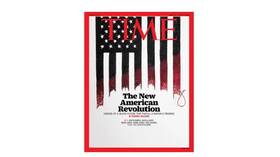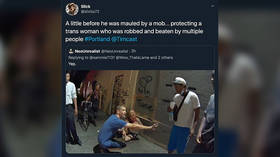Pharrell & Time’s 'New American Revolution' project is just another load of privileged whinging, NOT an anti-racist call to arms

Pharrell Williams has taken a break from his insanely successful and lucrative musical career to tell us in TIME how oppressed he is. Don’t waste your time on this edition, unless millionaires complaining is your idea of fun.
It would appear that the man who literally wrote, produced and performed the most played song of the last decade is, ironically, not “Happy.” Pharrell has curated the latest edition of Time Magazine, the cover of which calls for a “New American Revolution” and has an unfinished Star-Spangled Banner falling down it and promises “Visions of a Black future.”
Once inside, the reader is plunged into a sea of critical race theory, off cuts of the 1619 project, and lectures on how endemic white supremacy is in America today. The fact that all the articles are written by, are about, or are a transcript of a conversation between wildly successful Black (capital B – always) people seems to do nothing to disabuse them of the notion that the entire system of the United States is designed to keep them down.
In his own article Williams begins by talking about slavery and how the first ship of slaves arrived in 1619. The project of the same name argues that this is the actual date America was founded, not 1492 when Columbus got there, not 1776 when they had the revolution but on the arrival of the first slave ship. He argues that America was founded in the spirit of “liberty and justice for all” but that “all has never meant Black people.”
Plainly this was true at the nation’s inception and for much of its history, but to say that is still the case seems a stretch, especially when one considers the previous US president was Black. That is obviously not to say that inequalities don’t still exist in America, they do, but to argue that Black Americans still aren’t free seems to denigrate the achievements of those in the past such as Martin Luther King Jr and Frederick Douglass. One also has to ask what Pharrell would consider freedom if he doesn’t consider himself free when he is worth an estimated $150 million.
He goes on to liken the BLM/Antifa riots of today to the Boston Tea Party and draws a parallel between the tearing down of statues now and the ripping down of a rendering of King George in 1776. But this holds no water, as the government he is railing against was installed by a free and fair election. Donald Trump may be many things, but a King across the sea he is not. Calling for a revolution just because your team didn’t win the last time and you fear they might not again isn’t courageous, it’s childish.
Obviously, reparations then come up, demanding interest on the profits of slavery and even that “their” tax dollars from the New Deal get refunded. There are of course no numbers given or suggestions on how this should be done, nor even if he, as a multimillionaire, should also receive this money that was allegedly previously given to his “white (lower case w – always) brothers and sisters”..He then calls for a Black vision of the future, which is explained in the rest of the issue.
After Pharrell’s opening statement we are greeted with a series of articles from other very successful Black people discussing how terrible America is. There is another Pharrell-centric article about how his new collaboration “Entrepreneur” with Jay Z (estimated net worth: $1 billion) is a celebration of Black ambition, as apparently that isn’t immediately obvious. In the song they urge people to support black-owned businesses, such as theirs, presumably.
In another article, a Black transwoman named Imara Jones informs us that Black transwomen are essential to our future. This is apparently because they have been “failed by everything” and this makes them “the most visionary and progressive” leaders. Quite how society has failed Jones, a graduate of Columbia University and the London School of Economics, former Clinton White House adviser on international trade policy and Viacom executive who now owns her own media company, is not immediately obvious, nor does it become any more obvious having read the article. However, she reliably informs us that the future is not only Black but also trans, which will come as a shock to the 99.4 percent of Americans who are plain old “cisgendered.”
There are other articles that tell us the extraordinary story of how being a left-wing activist enabled a young woman, Danielle Geathers, to become the first Black woman student body president at MIT, because we all know how notoriously right-wing Massachusetts student politics can be. Then there is an article calling for revolution from Janaya Future Khan, the queer, Canadian, gender non-conforming International Ambassador for Black Lives Matter, (yep, turns out that’s a thing). In it “they” advocate for “Afrofuturism,” which is literally the plot of Marvel’s Black Panther. It would appear the fact that Black Panther is the brainchild of two dead old white men and the fact that Vibranium, the metal that enables the fictional nation Wakanda to thrive, does not exist.
The rest of the issue is given over to the transcripts of a series of Zoom conversations between other wildly successful Black people, including the likes of Tyler, the Creator, Naomi Osaka, the director of a pharmaceutical company, and a congresswoman, to name but a few. All of them lamenting the state of the nation that has allowed them to be so successful.
Also on rt.com Wayne Dupree: Hands off my history! Anarchic mobs tearing down statues are vanguard to socialist futureHowever, there is one sensible article amongst the revolutionary nonsense. It is an article by Rapper 21 Savage discussing the importance of financial literacy for young people. It is a well thought out piece written from experience and is actually filled with decent advice for people on how to manage their finances. He focuses on financial issues in the BIPOC (Black, Indigenous, People of Color) community, but what makes his piece good is the fact that the advice is good for everyone. It applies just as much to a white person from Appalachia as a Black person from Atlanta or Compton.
If you enjoy reading critical race theory, neo-Marxist nonsense edited by a multimillionaire who has been so oppressed by America that he owned a hat that sold for over $44,000, then this is the magazine for you. If it isn’t, you’ll get more enjoyment re-reading the Corn Flakes packet for the 27th time.
Think your friends would be interested? Share this story!
The statements, views and opinions expressed in this column are solely those of the author and do not necessarily represent those of RT.
















